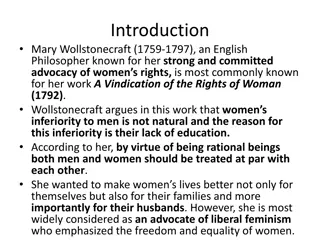The Importance of Women Leadership in Higher Education
Leah Busam, a leader and professional, emphasizes the significance of women in leadership roles in universities. The content discusses the underrepresentation of women in key positions, highlighting the need for greater female participation in leadership. It showcases statistics on women's enrollment, graduation rates, and leadership roles in student organizations. The images underscore the impact of women leaders on democracy and society, promoting skill development, career advancement, and changing the leadership agenda. Attendees are encouraged to engage actively, without political bias, in discussions to empower women in leadership roles.
Download Presentation

Please find below an Image/Link to download the presentation.
The content on the website is provided AS IS for your information and personal use only. It may not be sold, licensed, or shared on other websites without obtaining consent from the author. Download presentation by click this link. If you encounter any issues during the download, it is possible that the publisher has removed the file from their server.
E N D
Presentation Transcript
Leah Busam, Senior Director for Student Affairs Xavier University Student Organizations Academy September 16, 2017
Who am I? Leader Student Professional Mother of 3 Wife Xavier Alum
Our time together Agenda Participation is expected! We ll use polls, discussion, and active listening A few caveats Gender binary No right or wrong answers Not about advancing political agenda
Please follow the instructions: Text LEAHBUSAM982 to 37607
Womenby the # 50% of the US population 47% of the workforce As chief executives at S&P 500 companies = 5.8% In political leadership = Less than 20% of Congress Less than 25% of seats in state legislatures Only 5 governor seats
At universities Women attend college at higher rates than men Women earn more degrees than men At Xavier Women earn more degrees than men Student representation Women = 54% of all undergrads Women = 63% of all graduate students 6-year grad rates= 74% for women, 68% for men Student organization leaders Women hold 64% of student organization officer positions
Necessary for a representative democracy Women leaders change the agenda Women leaders change how we perceive leadership Women leaders have untapped talent
Provides opportunity Access to status and privilege associated with leadership Promotes skill development Provides preparation for career advancement
Lets take another poll What are the characteristics of women as leaders? What are the characteristics of men as leaders?
Female Leadership Characteristics Collaborative Relational Democratic Consensus-building Transformational Male Leadership Characteristics Task-oriented Hierarchical Autocratic Individualistic Transactional What do you think? Do men and women have different leadership styles or traits?
Some research suggests that Women are more focused on impact Women are less interested in power Women are less interested in getting to the next leadership role Female leaders are more common in the education, environment, and healthcare sectors. Male leaders are more common in the financial, engineering, military, and political realms.
America is afraid of ambitious women Are we more or less accepting of ambitious men or women?
Women can be perceived as either as likable or as competent leaders, but not as both. Do women need to be likable to lead? Do men need to be likable to lead?
Men apply for a job when they meet only 60% of the qualifications, but women apply only if they meet 100% of them. Are men/women more or less qualified? Are men/women more or less confident?
When women run, they are more likely to win. Why don t women run for roles at the same rate as men? What are the barriers to women running for elected positions? Are we willing to elect women for top roles?
Family/parental encouragement Exposure to conversation about politics Competitiveness Often tied with participation in sports Success in a prior leadership role Encouragement Especially from a respected authority Absence of negative feedback about being a leader Role Models Seeing the example of people like you in leadership roles
What could we do to inspire more women to lead? What do we need more of? What do we need less of? What do we need to change?























